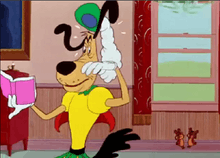A Ham in a Role
| A Ham in a Role | |
|---|---|
| Looney Tunes (Goofy Gophers) series | |
 The Goofy Gophers begin to get their revenge at their nemesis by "lending him ears". | |
| Directed by | Robert McKimson |
| Produced by |
Edward Selzer (uncredited) |
| Story by | Sid Marcus |
| Voices by |
Mel Blanc Stan Freberg (uncredited) |
| Music by | Carl Stalling |
| Animation by |
Charles McKimson Phil DeLara J.C. Meléndez Emery Hawkins Pete Burness (uncr.)[1] |
| Layouts by | Cornett Wood |
| Backgrounds by | Richard H. Thomas |
| Studio | Warner Bros. Cartoons |
| Distributed by |
Warner Bros. Pictures The Vitaphone Corporation |
| Release date(s) | December 13, 1949 |
| Color process | Technicolor |
| Running time | 6 minutes 47 seconds |
| Language | English |
| Preceded by | Two Gophers from Texas |
| Followed by | A Bone for a Bone |
A Ham in a Role is a Looney Tunes short starring the Goofy Gophers along with an unnamed dog who is based on stage/film actor John Barrymore. The cartoon was directed by Robert McKimson. It was released by Warner Bros. Pictures on December 13, 1949,[2]:205[3]:430 but some sources list the release date as December 31, 1949.[4]:246 The cartoon draws heavily from the works of William Shakespeare, with its gags relying on literal interpretations of lines from Hamlet, Julius Caesar, Richard III, and Romeo and Juliet.
A Ham in a Role would be the last cartoon in the Golden Age of American Animation (he would be recycled for a single short in the 1990s in the World Premiere Toons series) to star the dog that had opposed the Gophers in their first two appearances. In addition, this is the first Gophers cartoon to be directed by McKimson; it was supposed to be directed by Arthur Davis, but when Warner Bros. Cartoons reduced from four units to three, A Ham in a Role was reassigned to McKimson, along with animators J.C. Melendez and Emery Hawkins.
Plot
An anthropomorphic dog is tired of appearing in cartoons and goes home to study the works of Shakespeare. Upon arriving back home, the dog finds that his home has been invaded by gophers. Unfazed, the dog then begins reading Hamlet. Upon discovering the Goofy Gophers sleeping in the book, he throws the book out the window.
The Goofy Gophers then decide to get back at the dog by literally interpreting lines from Shakespeare's works, including "lending him ears", by rolling a curtain up to annoy him, tormenting him with flames (to his foot), dousing him with "the joy of life" (by dumping a tub of water into the dog), dumping limburger cheese as the dog utters the "that which we call a rose by any other name" line while holding a rose, imitating the exhumed Yorick in a dance (making the dog appear like a Shakespearean coward), using magnets on the floor and ceiling to toss and carry the dog around the room (in armor), with the coup de grâce coming about when the Gophers use a horse to kick the dog out of his house, after he says "A horse, a horse, my kingdom for a horse!" and back to the studio, where the dog decides to finish what he started.
Notes
This cartoon was originally issued as a Looney Tunes cartoon with the Looney Tunes music. When it was re-issued in 1959, the cartoon was re-issued with Merrie Melodies credits, but retained the Looney Tunes music.
References to Shakespeare
(By Order of Appearance and Character Role)
Hamlet Act 3, Scene 1 (Hamlet)
Julius Caesar Act 3, Scene 2 (Marc Antony)
Hamlet Act 1, Scene 5 (Ghost)
Romeo and Juliet Act 2, Scene 2 (Juliet)
Hamlet Act 5, Scene 1 (Hamlet, about Yorick)
Hamlet Act 1, Scene 5 (Hamlet, to Ghost)
Julius Caesar Act 2, Scene 2 (Julius Caesar)
Richard III Act 5, Scene 3 (Richmond giving his oration to his soldiers)
Richard III Act 5, Scene 4 (Catesby and Richard III)
Romeo and Juliet Act 2, Scene 2 (Juliet)
Hamlet Act 3, Scene 1 (Hamlet, with a comedic twist)
Availability
- DVD - Looney Tunes Golden Collection: Volume 6, Disc 1 (with original cards)
- Blu-ray - Looney Tunes Platinum Collection: Volume 3, Disc 1
References
- ↑ http://cartoonresearch.com/index.php/robert-mckimsons-a-ham-in-a-role/
- ↑ Beck, Jerry; Friedwald, Will (1989). Looney Tunes and Merrie Melodies: A Complete Illustrated Guide to the Warner Bros. Cartoons. New York, NY: Henry Holt and Company. ISBN 0-8050-0894-2.
- ↑ Maltin, Leonard. Of Mice And Magic: A History Of American Animated Cartoons (Revised ed.). New York, NY: Plume. ISBN 0-452-25993-2.
- ↑ Schneider, Steve (1988). That's All Folks!: The Art of Warner Bros. Animation. New York, NY: Henry Holt and Company. ISBN 978-0805008890.